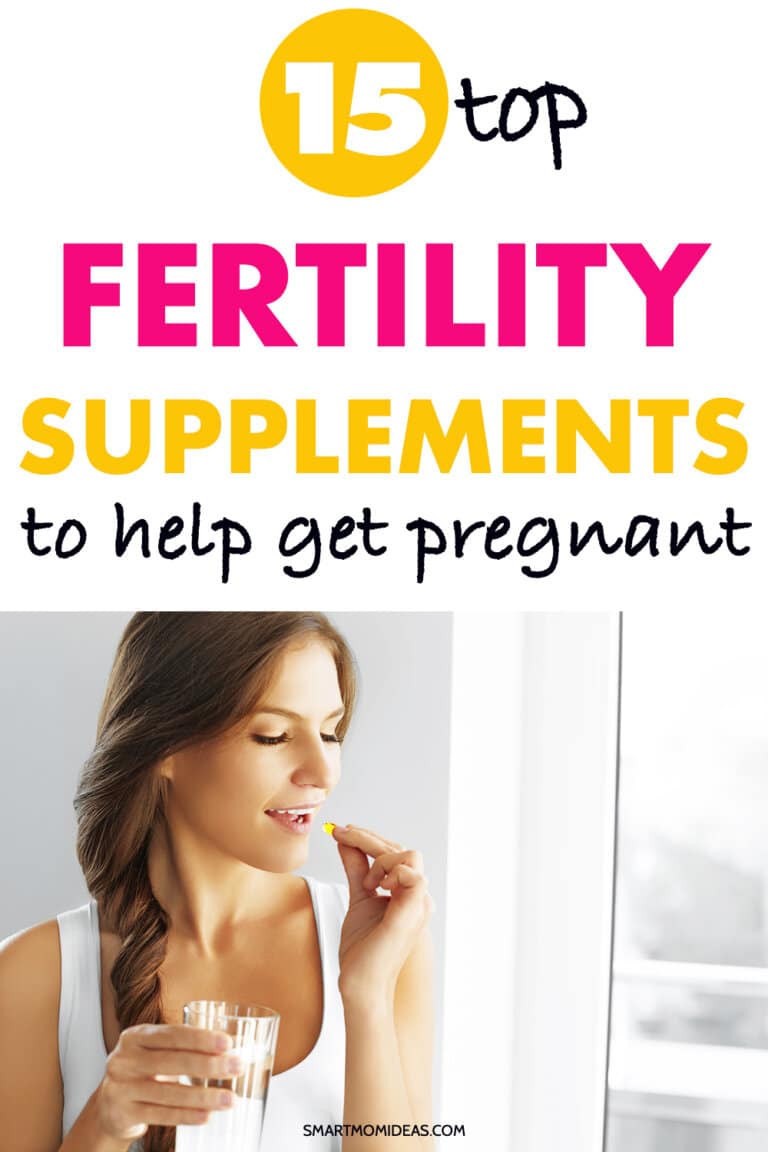Top fertility supplements if your having a hard time trying to get pregnant

Are you trying to have a baby but nothing seems to be happening?
Here’s an interesting fact: A woman’s natural fertility rate is about 20% per month. That means for every 100 fertile women trying to get pregnant in one cycle, only 20 will be successful.
While we are biologically designed to make babies, that doesn’t mean it will happen every try.
However, your overall health plays an important role in how likely you are to conceive.
With fertility supplements, which are mostly comprised of healthy vitamins and minerals, you can give your body’s health a super-boost while increasing your chances of getting pregnant.
Word of caution: Always speak to your doctor before adding any sort of supplement to your body.
You want to make sure it doesn’t interfere with any medications you are taking or your current diet.
Otherwise, here are some fertility supplements you can try to help you get pregnant.
1. Evening Primrose Oil
Native to North America, evening primrose is a flowering plant that contains omega-6 and omega-3 fatty acids.
These fatty acids have anti-inflammatory properties that can help ease inflammation that contributes to fertility and improve cervical mucus.
Evening primrose oil can also help regulate female reproductive hormones and ovulation which can help increase your fertility.
Where to find it: You can purchase evening primrose oil online in liquid-form or as soft-gel capsules.
2. Vitamin D
Vitamin D is a fat-soluble vitamin that helps with the production of sex hormones. Studies have shown that infertile women typically have a lower level of Vitamin D.
This vitamin also helps to reduce inflammation which can improve your overall fertility.
Where to find it: You can find vitamin D naturally in fortified dairy products, fatty fish, cod liver oil and getting out into the sunshine!
3. Vitamin B8
Scientifically known as myo-inositol, Vitamin B8 is widely used in fertility supplements as well as to help regulate menstruation and improve ovulation.
It is often used to help with PCOS (polycystic ovary syndrome), a condition that affects a woman’s hormone levels and makes it harder to get pregnant.
This vitamin can also help promote egg quality, boost reproduction and reduce inflammation and hypertension.
Where to find it: Vitamin B8 can be found in chocolate (yum!), lentils, dried beans, peas, nuts, bananas, strawberries, cabbage, mushrooms, tomatoes, carrots, brewer’s yeast and oat flakes – just to name a few!
4. Chasteberry
Chasteberry, also known as vitex agnus-castus, is an herb that can be used as a fertility supplement by reducing prolactin levels in women as well as balance progesterone and estrogen levels.
Balancing and regulating these hormones contribute to a healthier and more regular period which can improve ovulation and increase fertility.
Chasteberry can also provide relief from uncomfortable pre-menstrual symptoms.
Where to find it: Chasteberry can be bought as an herbal tincture, a tea or in capsule form.
5. Reishi
Reishi is a Japanese mushroom that has been used in Chinese medication for thousands of years. It is commonly used to boost the immune system but can also be used to improve fertility.
This fertility supplement helps to improve reproductive health by lowering stress and calming the nervous system.
It also supports the health of your liver which is key in keeping your hormones properly balanced.
Where to find it: You can check local ethnic markets for Reishi or you can order it online.
6. Coenzyme Q10 (CoQ10)
Coenzyme Q10, or CoQ10 for short, is a natural enzyme that promotes heart health as well as egg and sperm quality.
Some studies have shown that CoQ10 may be able to reverse the symptoms of age-related reproductive decline.
Where to find it: Fish, organ meats (such as heart and kidneys) and wheat germ are all natural sources of CoQ10.
7. Iron
Perhaps one of the most important fertility supplements you can try is iron. Research shows that insufficient iron levels can prevent ovulation and lead to poor egg health.
Iron should be taken while trying to conceive as well as during pregnancy. However, you should always speak with your doctor before taking an iron supplement – too much iron can lead to toxicity.
Otherwise, you can find iron in many natural sources.
Where to find it: Iron can be found naturally in red meat, pork, poultry, seafood, beans, dark leafy vegetables, dried fruit and iron-fortified cereals, bread and pasta.
8. Zinc
Zinc increases your chances of conception by regulating normal hormone function and ovulation.
Since the tail and outer covering of the sperm is made from zinc, zinc is a good fertility supplement for men. Including zinc in a man’s diet can help improve sperm motility and quality.
Since our bodies don’t store zinc, it’s important to ensure that this mineral is included in your regular diet.
Where to find it: You can take a zinc supplement or eat foods such as meat, fish, legumes, seeds, nuts, dairy, eggs and whole grains.
9. Omega-3 Fatty Acids
I mentioned above that evening primrose oil is full of fatty acids. Omega-3 fatty acids, in particular, are a great fertility supplement.
They work by increasing blood flow to the uterus which helps ovarian follicles release eggs. Omega-3 fatty acids also lower inflammation and provide essential nutrients to the semen, which can help boost fertility in men.
Your body can’t produce Omega-3’s, so it’s important to make sure you are receiving this nutrient in your diet.
Where to find it: Fish, seafood, chia seeds, plant-based oils and fortified foods such as eggs, yogurt and milk are all great sources of Omega-3 fatty acids.
10. Red Raspberry Leaf
Red raspberry leaves, from the red raspberry shrub, contain citric acid, carotenoids, vitamin A, vitamin B and other vital nutrients – all of which have a soothing effect on the uterine muscles.
By toning the uterine muscles, red raspberry leaf can help the embryo attach to the uterine wall and increase progesterone, which is an important hormone when it comes to having a healthy pregnancy.
Where to find it: You can buy red raspberry leaf as a tea, tincture or in capsules.
11. Selenium
Selenium is an antioxidant that can positively impact the health of the follicles in your ovaries and promote the development and release of eggs.
If you choose to take a selenium supplement, talk to your doctor first to determine what is the best amount per day.
As far as fertility supplements for men go, selenium is an excellent choice. It helps to increase sperm count.
Where to find it: Selenium can be found in foods such as organ meats, seafood, nuts and grains.
12. Vitamin B6
Another vitamin that has been proven as a good fertility supplement is vitamin B6. Vitamin B6 has been shown to balance estrogen and progesterone levels, which factor in heavily when it comes to reproduction.
This vitamin also increases your cervical mucus which helps the sperm easily reach the egg and strengthens the luteal phase of your menstrual cycle, which makes your uterus more receptive to conception.
Where to find it: Foods naturally rich in vitamin B6 include fish, pork, eggs, bread, soya beans and chicken.
13. Herbal Teas
While herbal teas aren’t necessarily a fertility supplement, they are a great way to change your caffeine-ingesting habits to help boost your chances of getting pregnant.
High levels of caffeine can interfere with ovulation and lengthen the time it can take to get pregnant.
When you’re trying to get pregnant, it’s recommended to limit and monitor your caffeine intake.
However, if you need that energy boost to get through your day, consider switching to herbal teas such as green tea, which has much lower caffeine levels than coffee.
Where to find it: Anywhere! But you can definitely buy green tea online as well as specially formulated fertility teas.
14. DHEA
DHEA (dehydroepiandrosterone) can be a mouthful to say but it is also an important hormone made in the body that helps to produce estrogen.
When DHEA levels start to decrease, usually related to age, egg quality can decrease as well and lead to fertility issues.
Studies have shown that DHEA supplementation can have a positive effect on egg quality and increase your chances of conception.
The best way to get more DHEA into your system is to take a supplement. Simply eating the ingredients the supplement is made of (yams and soy) is not enough to make a difference.
Where to find it: DHEA supplementation is something you should speak to your doctor about before attempting. You can find it online or at your local pharmacy.
15. Maca
Maca is a hormone-balancing herb known for boosting fertility – for both men and women.
It helps the body cope with stress and balances hormones, both of which can contribute to an increased chance of conception.
It is also rich in vitamins and minerals, which is important for reproductive health.
Just be careful when taking maca – it should only be taken between menses and ovulation and must be discontinued after conception.
Where to find it: You can buy maca powder and maca capsules online.
Using Fertility Supplements: Things to Consider
The first question most women have when turning to fertility supplements is: “Do they really work?”
Science has proven that, yes, they really do – but every woman and her body is different. What works for one may not work for the other.
However, supplements are worth your time because they provide you with healthy nutrients that are likely lacking in your diet. By taking supplements, you are boosting your overall health.
And having good overall health is key to increasing your fertility.
Your body will avoid conceiving a baby if it’s not healthy enough to nurture it.
That being said, it’s important to talk to your doctor about any underlying causes of infertility.
While fertility supplements can have a positive impact on your reproductive health, you may need more medical support.
Also, talk to your doctor before taking any fertility supplements to ensure that you are receiving the right amount and not interfering with your regular diet.
15 Fertility Supplements to Help You Get Pregnant
Fertility issues are not an easy thing for women and their partners to deal with when they want to have a child.
But if there’s no underlying medical issue, a simple health-overhaul using fertility supplements may be all it takes to get your reproduction on track!
Good luck!
Have you had any experience using fertility supplements? How did it go?
I’d love to hear your stories in the comments!




Leave a Reply